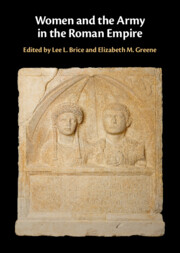Book contents
- Women and the Army in the Roman Empire
- Women and the Army in the Roman Empire
- Copyright page
- Dedication
- Contents
- Figures
- Maps
- Tables
- Contributors
- Acknowledgments
- Abbreviations
- Maps
- 1 Present but not Accounted For
- 2 Approaches to Women and the Roman Army
- 3 Agrippina and Company
- 4 Elite Marriage and Adultery in the Camp
- 5 Mother Courage and Her Children
- 6 Investigating Roles for Women inside Roman Military Bases through Artifact Distribution
- 7 (In)Visible Women and Children
- 8 Soldiers’ Wives en Route in Roman Egypt
- 9 The Role of Women in the Religious Activities of Roman Military Communities
- 10 Mater Castrorum
- 11 Women and the Military in the Age of Justinian
- Index
- References
10 - Mater Castrorum
Imperial Women and Succession Ideology
Published online by Cambridge University Press: 24 October 2024
- Women and the Army in the Roman Empire
- Women and the Army in the Roman Empire
- Copyright page
- Dedication
- Contents
- Figures
- Maps
- Tables
- Contributors
- Acknowledgments
- Abbreviations
- Maps
- 1 Present but not Accounted For
- 2 Approaches to Women and the Roman Army
- 3 Agrippina and Company
- 4 Elite Marriage and Adultery in the Camp
- 5 Mother Courage and Her Children
- 6 Investigating Roles for Women inside Roman Military Bases through Artifact Distribution
- 7 (In)Visible Women and Children
- 8 Soldiers’ Wives en Route in Roman Egypt
- 9 The Role of Women in the Religious Activities of Roman Military Communities
- 10 Mater Castrorum
- 11 Women and the Military in the Age of Justinian
- Index
- References
Summary
Between the late second and the early fourth century CE, several empresses received the title Mater Castrorum, either in official documents, inscriptions, and coinage or in unofficial honorific or dedicatory inscriptions erected by subjects. Scholars have assumed the title was indicative of a tight-knit relationship between the empresses and the soldiers. Recent studies of the numismatic and epigraphic evidence, however, have demonstrated that, at least in the cases of the early Matres Castrorum, the title was not descriptive of an actual relationship with the military. These studies argue it was the product of dynastic propaganda that prepared a smooth path for successors. Given this new, demonstrated understanding of the title’s original purpose this chapter investigates how the title fits into ideologies that emperors “negotiated” with the constituencies in the Empire. Based on the evidence, we conclude that the meaning and use of the Mater Castrorum title changed over time according to the agenda of those who employed it. The evolution of the title is not surprising, but as with so many aspects of investigations into women and the military, the complexities of its use have not previously been conceived of in this way.
Keywords
- Type
- Chapter
- Information
- Women and the Army in the Roman Empire , pp. 270 - 298Publisher: Cambridge University PressPrint publication year: 2024

